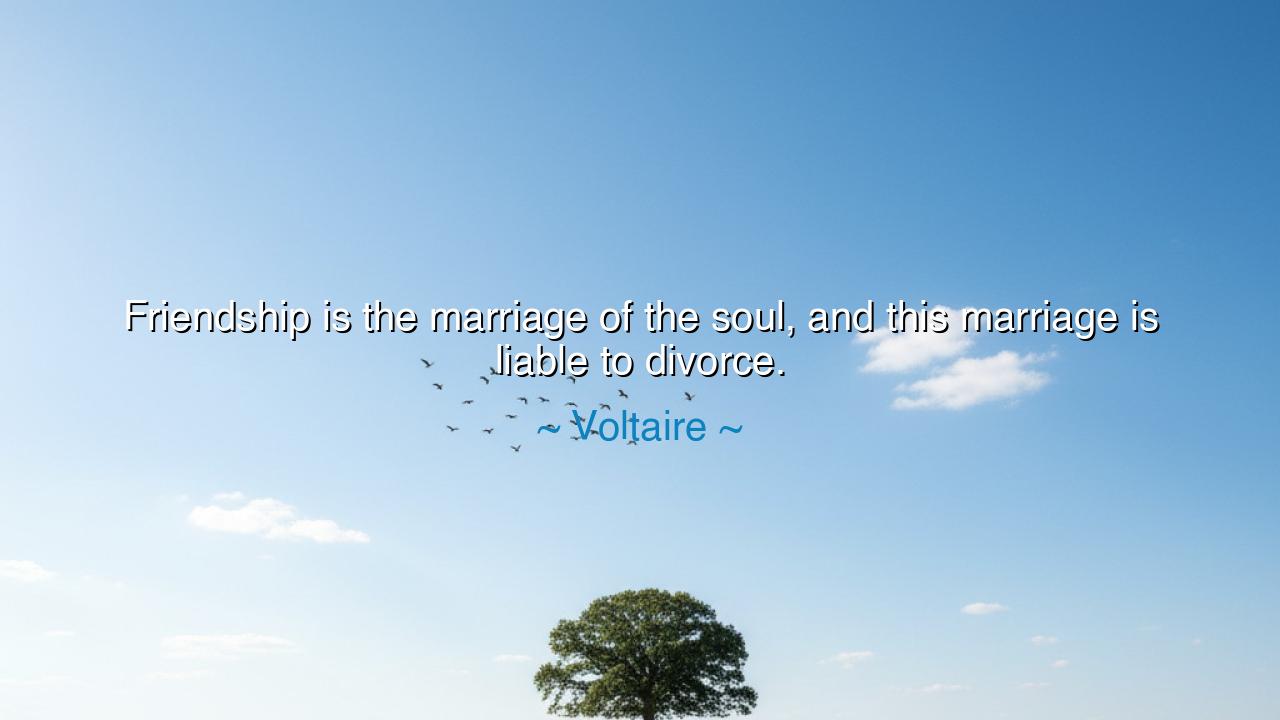
Friendship is the marriage of the soul, and this marriage is






“Friendship is the marriage of the soul, and this marriage is liable to divorce.” Thus spoke Voltaire, that brilliant spirit of the Enlightenment, whose wit pierced falsehoods and whose heart, though tempered by reason, understood the fragility of human bonds. In this profound reflection, he likens friendship to marriage, not in the form of flesh and ceremony, but in the union of souls—a bond of understanding, loyalty, and trust. Yet he does not veil the truth beneath sentiment; he acknowledges that this spiritual union, though noble, is as mortal as the beings who form it. Friendship, like marriage, is a sacred harmony easily broken by pride, jealousy, or neglect. It is divine in essence, but human in endurance.
The origin of this quote lies in Voltaire’s own tumultuous life—a man who, despite his brilliance and influence, knew both the triumph and the betrayal of friendship. He lived among philosophers, kings, and patrons, weaving alliances across Europe. Yet he often saw how affection soured, how admiration turned to envy, how differences of opinion shattered what seemed eternal. His friendship with Frederick the Great of Prussia is a living example of this truth. In the beginning, their letters glowed with admiration and mutual respect. Frederick called Voltaire the "man who taught kings to think," and Voltaire saw in the monarch a philosopher upon the throne. But pride, suspicion, and wounded vanity crept between them. Their marriage of the soul—built on intellect and affection—fell apart in bitterness. Thus, Voltaire spoke from the wisdom of loss, not cynicism, when he warned that even the purest friendship may face its divorce.
To call friendship “the marriage of the soul” is to reveal its sacred nature. For just as marriage binds two hearts in love, friendship binds two minds in trust and equality. It is not governed by law nor sustained by passion, but by mutual understanding and honor. In friendship, one soul mirrors another; one spirit finds in the other its echo. It is the joining of virtues—the meeting of courage, honesty, and affection. And yet, because this bond depends on harmony, it is delicate. A single false note—a word spoken in anger, a betrayal, a forgotten promise—can shatter the music. The divorce of souls comes not with courts or signatures, but with silence, distance, and the slow fading of once-shared light.
Consider the ancient tale of Aristotle and Hermias of Atarneus, the philosopher and the ruler whose friendship was born of shared intellect and mutual respect. Hermias, a man of virtue, treated Aristotle not as a subject but as a brother of the mind. Yet fate, cruel and indifferent, tore them apart. When Hermias was betrayed and executed by the Persians, Aristotle wept and composed a hymn in his memory—“O virtue, you are but a name, yet dearest to the soul.” In his grief, we glimpse the truth of Voltaire’s words: that even the noblest marriage of souls is not immune to separation, whether by betrayal, distance, or death. But in that pain also lies proof of friendship’s sacredness—for only what is divine can break our hearts when lost.
Voltaire’s wisdom is not meant to dishearten, but to awaken humility in the heart of man. He reminds us that friendship, like love, demands tending. It is not a treasure buried in the heart forever secure; it must be renewed by honesty, compassion, and forgiveness. Too often, we assume that friendship, once formed, will endure without care. But neglect, like time, erodes even the strongest foundations. To preserve friendship, one must labor as the gardener does—removing the weeds of pride, watering the soil with gratitude, and allowing the light of truth to shine freely. Only then can the marriage of souls remain whole.
Yet there is another layer of truth in Voltaire’s words—a recognition that the impermanence of friendship is not its failure, but its beauty. For what is fragile reminds us to cherish it all the more. To know that friendship is liable to divorce is to understand that it is also a choice renewed each day, not a chain of obligation but a living promise. We are mortal, imperfect beings; our hearts falter, our tempers rise, our paths diverge. But each time we forgive, each time we reach out again across the gulf of misunderstanding, we defy that mortality and touch the eternal.
Let this, then, be the lesson: hold your friendships not with fear, but with reverence. Do not assume their permanence, but guard them with gentleness. When conflict comes—and it will—choose patience over pride, and understanding over judgment. Remember that every true friend is a second soul entrusted to your care. Love them not for what they give, but for who they are; not for convenience, but for companionship. For though friendship may one day falter or fade, the love that once united two souls leaves a fragrance that time cannot erase.
Thus, as Voltaire teaches, friendship is both our highest joy and our greatest trial. It is the marriage of the soul, radiant and sacred, yet ever vulnerable to the storms of life. To honor it is to live wisely; to lose it is to understand the depth of our humanity. And though some marriages of the soul may indeed dissolve, let us live in such a way that no friendship fails through neglect or pride, but only through the turning of the stars. For in every true friend, the soul finds not only its reflection, but its redemption.






AAdministratorAdministrator
Welcome, honored guests. Please leave a comment, we will respond soon